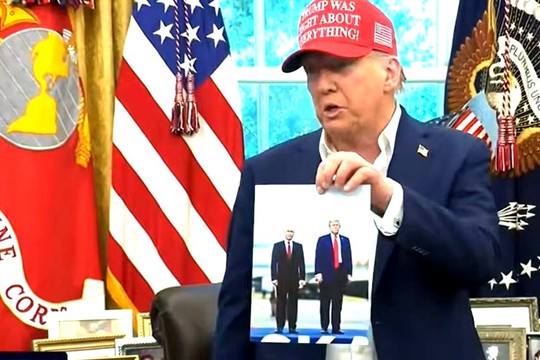Trump at Oval office showed a photo of himself with Putin, taken at Alaska summit. He stated that the Russian president may visit the United States for the World Cup next summer, shocking all NATO.
Photo: YouTube Video Screenshot
The US President is employing delaying tactics on sanctioning Moscow, seeing Ukraine as only one front in the real battle against China, and eroding NATO unity, UnHerd notes.
US President Donald Trump has once again announced plans to implement major sanctions on Russia. This time, there is a new condition attached, rather than the past open-ended threats which never materialised. Exhausting both his allies’ patience and his caps lock button, he posted: “I am ready to do major Sanctions on Russia when all NATO Nations have agreed, and started, to do the same thing, and when all NATO Nations STOP BUYING OIL FROM RUSSIA.”
What is Trump’s strategy here? It might appear that he’s changed his tune, but the statement contains some unmistakably familiar notes. There is the obsession with the US not single-handedly carrying the bulk of responsibility within NATO, as has been demonstrated over defence spending. Ever the dealmaker, Trump’s commercial instincts are also on full display. The EU has pledged to phase out Russian oil by 2028, a timetable that the White House wants accelerated through more purchases from the US. Nuclear power is another flashpoint, with the US urging Europe to switch from Russian to American resources.
Moreover, Trump has lost no appetite for dragging allies into Sino-American tensions. His post added: “I believe that [NATO sanctions on Russia], plus NATO, as a group, placing 50% to 100% tariffs on China, to be fully withdrawn after the war with Russia and Ukraine is ended, will also be of great help in ending this deadly, but ridiculous war.” While the US has been urging European and G7 countries to immediately impose secondary tariffs of between 50% and 100% on Delhi and Beijing for their purchases of Moscow’s oil, Europe has been reluctant due to concerns about the economic impact on its consumers, likely retaliation from China, and damage to its planned trade deal with India.
UK Prime Minister Keir Starmer will this coming week try to sell the US President on targeted sanctions on those Chinese and Indian companies importing Russian oil, as opposed to tariffs that could “start a trade war”. Yet Trump’s latest bout of public enthusiasm for the idea suggests Starmer will fail in his mission, with the US continuing to use the Ukraine war to make Europe choose between America on the one hand, and China and India on the other.
At first glance, Trump’s latest comments might indicate a push for a coordinated NATO stance or a shift away from his habitual delays on Russia. In reality, they are anything but. Hungary and Slovakia have blamed their continued Russian energy imports on a lack of alternatives, despite studies showing otherwise. Those nations are unlikely to risk their own warm relations with Russian President Vladimir Putin by pursuing other options and, even if they did, it could take time. This provides Trump with the ideal excuse for procrastinating on sanctions against the Kremlin, all while blaming it on others.
It is also notable that Trump’s statement centred on NATO, not Europe. Alliance member Turkey has been the third-largest purchaser of Russian oil since 2023, after China and India. At a time when Russia is aggressively probing NATO defences, Trump’s words are likely to exacerbate tensions and undermine cohesion within the alliance.
The US President’s latest statement constitutes no real shift in position. Really, he is employing delaying tactics on sanctioning Moscow, seeing Ukraine as only one front in the real battle against China, and eroding NATO unity. Trump isn’t actually singing a different tune. But it will still be music to Putin’s ears.
read more in our Telegram-channel https://t.me/The_International_Affairs

 10:31 18.09.2025 •
10:31 18.09.2025 •























